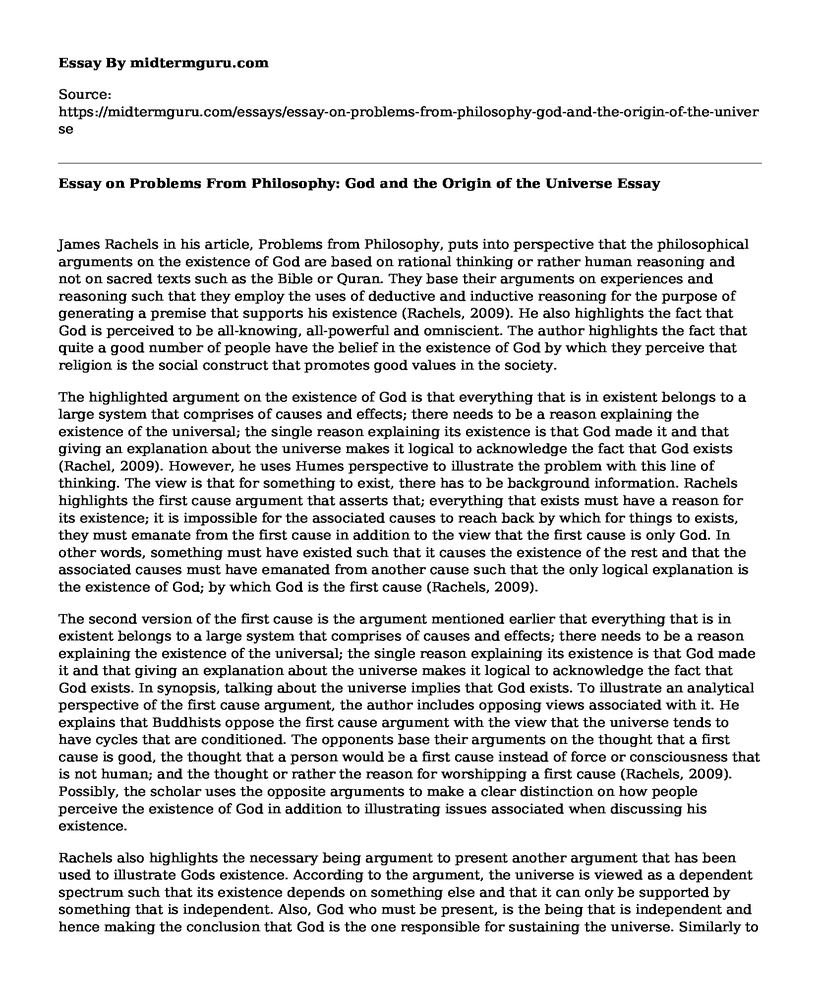James Rachels in his article, Problems from Philosophy, puts into perspective that the philosophical arguments on the existence of God are based on rational thinking or rather human reasoning and not on sacred texts such as the Bible or Quran. They base their arguments on experiences and reasoning such that they employ the uses of deductive and inductive reasoning for the purpose of generating a premise that supports his existence (Rachels, 2009). He also highlights the fact that God is perceived to be all-knowing, all-powerful and omniscient. The author highlights the fact that quite a good number of people have the belief in the existence of God by which they perceive that religion is the social construct that promotes good values in the society.
The highlighted argument on the existence of God is that everything that is in existent belongs to a large system that comprises of causes and effects; there needs to be a reason explaining the existence of the universal; the single reason explaining its existence is that God made it and that giving an explanation about the universe makes it logical to acknowledge the fact that God exists (Rachel, 2009). However, he uses Humes perspective to illustrate the problem with this line of thinking. The view is that for something to exist, there has to be background information. Rachels highlights the first cause argument that asserts that; everything that exists must have a reason for its existence; it is impossible for the associated causes to reach back by which for things to exists, they must emanate from the first cause in addition to the view that the first cause is only God. In other words, something must have existed such that it causes the existence of the rest and that the associated causes must have emanated from another cause such that the only logical explanation is the existence of God; by which God is the first cause (Rachels, 2009).
The second version of the first cause is the argument mentioned earlier that everything that is in existent belongs to a large system that comprises of causes and effects; there needs to be a reason explaining the existence of the universal; the single reason explaining its existence is that God made it and that giving an explanation about the universe makes it logical to acknowledge the fact that God exists. In synopsis, talking about the universe implies that God exists. To illustrate an analytical perspective of the first cause argument, the author includes opposing views associated with it. He explains that Buddhists oppose the first cause argument with the view that the universe tends to have cycles that are conditioned. The opponents base their arguments on the thought that a first cause is good, the thought that a person would be a first cause instead of force or consciousness that is not human; and the thought or rather the reason for worshipping a first cause (Rachels, 2009). Possibly, the scholar uses the opposite arguments to make a clear distinction on how people perceive the existence of God in addition to illustrating issues associated when discussing his existence.
Rachels also highlights the necessary being argument to present another argument that has been used to illustrate Gods existence. According to the argument, the universe is viewed as a dependent spectrum such that its existence depends on something else and that it can only be supported by something that is independent. Also, God who must be present, is the being that is independent and hence making the conclusion that God is the one responsible for sustaining the universe. Similarly to the fist cause argument, the necessary being argument is also affiliated with objections that assist in clarifying the existence of God by which they align with the arguments used in opposing the first cause. He asserts that Buddhists oppose the first cause argument with the view that the universe tends to have cycles that are conditioned. The opponents base their arguments on the thought that a first cause is good, the thought that a person would be a first cause instead of force or consciousness that is not human; and the thought or rather the reason for worshipping a necessary being. He also introduces an argument based on religion. According to the argument, there have been several cases of people reporting having an experience with the supernatural; the people are viewed as telling the truth and hence showing that there exists the supernatural. The objections affiliated to the argument is that there is a difference between perceptual and religious experiences and that natural explanations tend to explain religious experiences (Rachels, 2009).
From a personal perspective, the author has approached his study from an analytical perspective such that one can fully understand the reasons present on the existence of God. The article allows one to make a reflection and critically analyze the belief in the supernatural and how it is approached. Also, the piece adds value to the religious philosophies in regards to understanding various perceptions have when it comes to the supernatural.
References
Rachels, J. (2009). Problems from Philosophy. New York: McGraw-Hill.
Cite this page
Essay on Problems From Philosophy: God and the Origin of the Universe. (2021, Jun 04). Retrieved from https://midtermguru.com/essays/essay-on-problems-from-philosophy-god-and-the-origin-of-the-universe
If you are the original author of this essay and no longer wish to have it published on the midtermguru.com website, please click below to request its removal:
- Essay on Marxs Theory of Alienation and Philosophical Categories
- Essay on Impact of Western Consumer Ethics on the Fashion Industry
- Ethical Theories - Assignment Example
- Plato: Advocating Morality, Righteousness, and Justice - Essay Sample
- Ethics in Business: Utilitarian & Principles-Rights Frameworks - Essay Sample
- Ethical Principles for Improving Management & Service Delivery in Healthcare - Essay Sample
- Workplace Ethics Violations: Case Study







